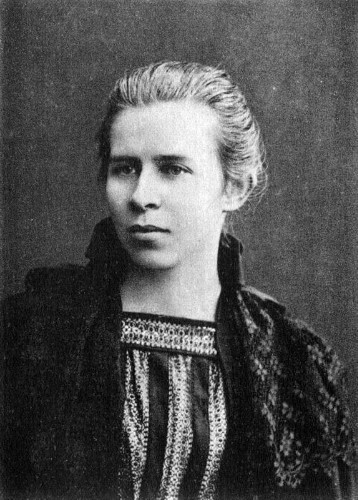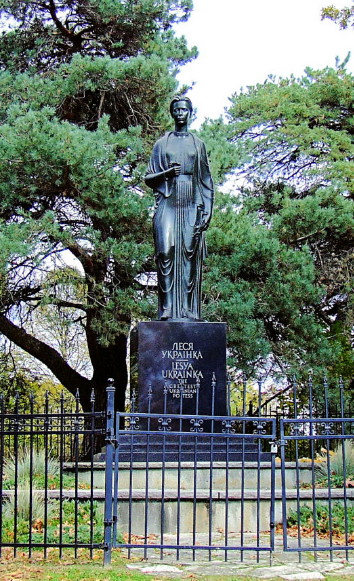Ukrainka, Lesia
Ukrainka, Lesia [Ukrajinka, Lesja] (pseud of Larysa Kosach-Kvitka), b 25 February 1871 in Zviahel (now Novohrad-Volynskyi), Volhynia gubernia, d 1 August 1913 in Surami, Georgia. Poet and playwright; daughter of Olha Kosach-Drahomanova (Olena Pchilka); wife of Klyment Kvitka. Lesia Ukrainka spent her childhood in Volhynia in the towns of Zviahel, Lutsk, and Kolodiazhne and then moved to Kyiv. Her views were particularly influenced by her mother's brother, Mykhailo Drahomanov. Lesia Ukrainka achieved a broad education by self-tuition. She knew all of the major Western European languages as well as Greek and Latin and the Slavic languages (Russian, Polish, Bulgarian, and others). She was equally familiar with world history and at 19 wrote a textbook for her sisters, published in 1918 as Starodavnia istoriia skhidnykh narodiv (Ancient History of the Eastern Peoples). Lesia Ukrainka translated a great deal (eg, Nikolai Gogol, Adam Mickiewicz, Heinrich Heine, Victor Hugo, Homer). Suffering from tuberculosis, she traveled to Germany, Austria-Hungary, Italy, Egypt, and, several times, the Caucasia in search of a cure. Travel exposed her to new enriching experiences and broadened her horizons. Lesia Ukrainka began writing poetry at a very early age. At the age of nine she wrote the poem ‘Nadiia’ (Hope), and her first published poems, ‘Konvaliia’ (Lily of the Valley) and ‘Safo’ (Sappho), appeared in the journal Zoria (Lviv) in 1884. 1885 saw the appearance of her collection of translations of Gogol, which she prepared together with her brother, Mykhailo Kosach.
Lesia Ukrainka began to write more prolifically from the mid-1880s. In Kyiv she joined the literary group Pleiada and together with Maksym Slavinsky translated Knyha pisen’ (Book of Songs, 1892) by H. Heine. Her first collection of original poetry, Na krylakh pisen’ (On Wings of Songs), appeared in Lviv (1893; 2nd edn, Kyiv 1904). It was followed by the collections Dumy i mriï (Thoughts and Dreams, 1899) and Vidhuky (Echoes, 1902). Her early poems deal mainly with the beauty of nature, her love of her native land, personal experiences, the poet's vocation and the role of poetry, and social and community concerns. Epic features can be found in much of her lyric poetry, and reappear in her later ballads, legends, and the like—‘Samson,’ ‘Robert Brus, korol’ shotlands’kyi’ (Robert Bruce, King of Scotland), ‘Vila-posestra’ (Vila Sister), ‘Odno slovo’ (A Single Word).
Lesia Ukrainka reached her literary heights in her poetic dramas. Ukrainka's first drama was Blakytna troianda (The Azure Rose, 1896), which describes the life of the Ukrainian intelligentsia. In further dramatic works she developed a new genre, that of the ‘dramatic poem.’ The first such work was Oderzhyma (A Woman Possessed, 1901). Particularly important among her works are the dramatic poems on the subject of prisoners in Babylon, which were meant to serve as symbols of the imprisonment of Ukrainians within the Russian Empire; among them are Na ruïnakh (Upon the Ruins, 1903), Vavylons’kyi polon (The Babylonian Captivity, 1903), and V domu roboty—v kraïni nevoli (In the House of Labor, In the Land of Slavery, 1906). In the dramatic poem Kassandra (1907) she portrayed the fate of Ukraine through the tragic history of long-lost Troy, and using Cassandra as her spokesperson, she challenged the Ukrainian people to shake off their apathy and inertia. In the dramatic poem U katakombakh (In the Catacombs, 1905) she also castigated the Ukrainian community for its compromises and passivity. In the drama Rufin i Pristsilla (Rufinus and Priscilla, 1908) the shining image of the Christian woman is contrasted with the brutal strength of Imperial Rome. The dramatic poem Boiarynia (The Boyar Woman, 1910) illustrates most clearly Ukrainka's hostility to Russian imperialism; it maintains that only armed struggle can free the Ukrainian people from their Muscovite prison. The theme of the poem Orhiia (The Orgy, 1912–13) concerns the poet's role in that ceaseless battle. In the dramatic poem Kaminnyi hospodar (The Stone Host, 1912) Lesia Ukrainka employs the Don Juan theme in an original presentation of the conflict between social conformity and personal freedom and responsibility. Her neoromantic work, the drama Lisova pisnia (The Forest Song, 1911), treats the conflict between lofty idealism and the prosaic details of everyday life. Lesia Ukrainka also wrote prose works. Her literary legacy is enormous, despite the fact that for most of her life she was ill and often was bedridden for months. The last few years of her life were spent convalescing in Egypt and the Caucasia. The works of Lesia Ukrainka have been published many times. The most notable editions, however, have been those of Knyhospilka (7 vols, 1923–5 and 12 vols, 1927–30), which include scholarly introductions by Mykola Zerov, Borys Yakubsky, Mykhailo Drai-Khmara, Petro Rulin, Yevhen Nenadkevych, Oleksander Biletsky, and others. Olha Kosach-Kryvyniuk's Lesia Ukraïnka: Khronolohiia zhyttia i tvorchosty (Lesia Ukrainka: A Chronology of Her Life and Works, New York 1970) is valuable for its biographical and epistolary material.
BIBLIOGRAPHY
Muzychka, Andrii. Lesia Ukraïnka, ïï zhyttia, hromads’ka diial’nist’ i poetychna tvorchist’ (Odesa 1925)
Drai-Khmara, Mykhailo. Lesia Ukraïnka: Zhyttia i tvorchist’ (Kyiv 1926)
Odarchenko, Petro. Lesia Ukraïnka i M.P. Drahomanov (New York 1954)
Babyshkin, Oleh; Kurashova, V. Lesia Ukraïnka: Zhyttia i tvorchist’ (Kyiv 1955)
Babyshkin, Oleh. Dramaturhiia Lesi Ukraïnky (Kyiv 1963)
Avrakhov, H. Khudozhnia maisternist’ Lesi Ukraïnky (Kyiv 1964)
Kulins’ka, L. Poetyka Lesi Ukraïnky (Kyiv 1967)
Bida, Constantine. Lesya Ukrainka: Life and Work, with Selected Works, trans by Vera Rich (Toronto 1968)
Kostenko, Anatol. Lesia Ukraïnka (Kyiv 1971)
Kulins’ka, L. Proza Lesi Ukraïnky (Kyiv 1976)
Vyshnevs’ka, N. Liryka Lesi Ukraïnky: Tekstolohichne doslidzhennia (Kyiv 1976)
Odarchenko, Petro. Lesia Ukraïnka: Rozvidky riznykh rokiv (Kyiv 1994)
Aheieva, Vira. Poetesa zlamu stolit': tvorchist' Lesi Ukraïnky v postmodernii interpretatsii (Kyiv 1999)
Zborovska, Nila. Moia Lesia Ukrainka: esei (Ternopil 2002)
Aheieva, Vira (ed). Ïm promovliaty dusha moia bude: ‘Lisova pisnia’ Lesi Ukraïnky ta ïï interpretatsiï (Kyiv 2002)
Petro Odarchenko
[This article originally appeared in the Encyclopedia of Ukraine, vol. 5 (1993).]
.jpg)
.jpg)
.jpg)
.jpg)
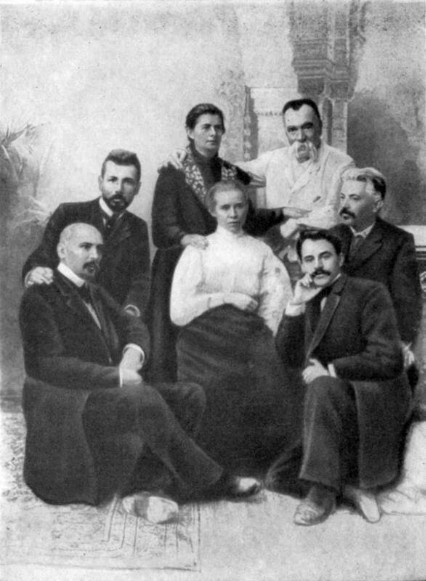
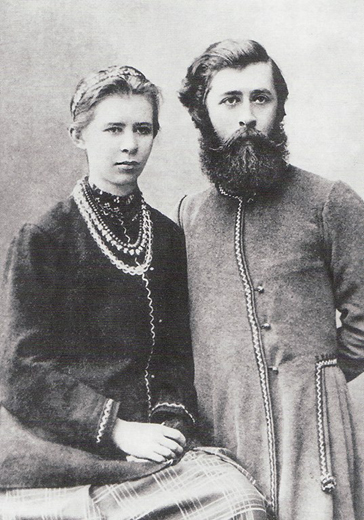
.jpg)
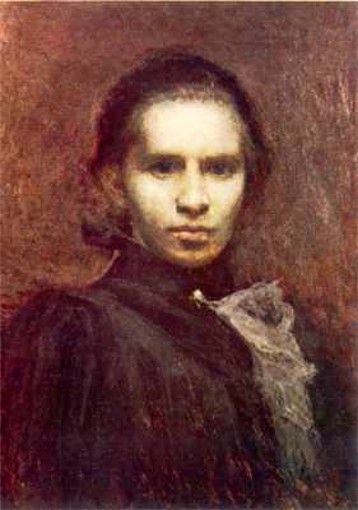
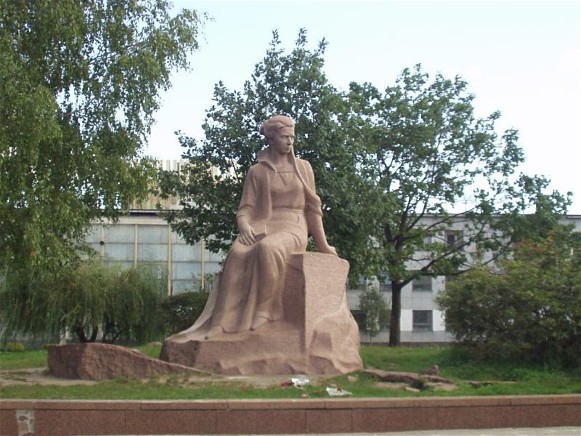
![Myron Levytsky: [Lesia Ukrainka's] Song of the Forest (1977). Image - Myron Levytsky: [Lesia Ukrainka's] Song of the Forest (1977).](https://www.encyclopediaofukraine.com/pic%5CL%5CE%5CLevytsky%20Myron%20Song%20of%20the%20Forest%201977.jpg)
